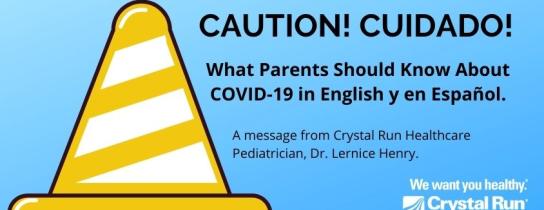
Understanding COVID-19: WE NEED TO CONTINUE TO PROCEED WITH CAUTION!
During the COVID-19 pandemic, it’s important to stay informed. The providers at Crystal Run Healthcare want to ensure you have the resources you need to make the best decisions for you and your family. Pediatrician, Dr. Lernice Henry, takes us through what you should know about the pandemic in English and Español.
What Should You Know About COVID-19?
1. COVID-19 is still a threat. If there is an outbreak somewhere, it is an outbreak everywhere. We are all in this together. It affects us all. COVID-19 can affect healthy children, adolescents, young adults and the elderly. It can cause death in any of these age groups. As the country is opening up and life is returning to what we consider to be normal, we must understand that the risk of infection is not over.
¿QUE’ DEBES SABER SOBRE COVID 19?; TENEMOS QUE SEGUIR PROCEDIENDO CON PRECAUCIÓN!
1.COVID-19 sigue siendo una amenaza. Si hay un brote en alguna parte, es un brote en todas partes. Estamos todos juntos en esto. Nos afecta a todos. COVID-19 puede afectar a niños sanos, adolescentes, adultos jóvenes y mayor. Puede causar la muerte en cualquiera de estos grupos de edad. A medida que el país se abre y la vida vuelve a lo que consideramos normal, debemos entender el riesgo de infección no ha terminado.
HOW DO YOU GET COVID-19?
2. A person can get COVID-19 when breathing, talking, singing, coughing and sneezing which produces respiratory droplets that can enter the body through the eyes, nose and mouth. COVID-19 spreads from person to person when they are in close contact.
¿COMO OBTIENES COVID-19?
2. Una persona puede contraer el virus de COVID-19 cuando respira, habla, canta, tose y estornuda, lo que produce gotas respiratorias que pueden entrar al cuerpo a través de los ojos, la nariz y la boca. COVID-19 se propaga de persona a persona cuando están en contacto cercano.
WHAT TO DO IF YOU ARE SICK?
a. Get Tested
b. Isolate
What is isolation?
A term used for a person who is sick. Isolation is keeping a sick person away from people who are healthy.
c. Quarantine
What is Quarantine?
Quarantine is a term used for a healthy person who has been in contact with an infected person. That healthy person should have no movement or contact with anyone for 14 days since the last contact with that sick person.
For example: If anyone tests positive for COVID-19 in a household, all that live in that home should self quarantine for 14 days.
¿Qué HACER SI ESTAS ENFERMO?
a. Hacerse la prueba
b. Aislarse
¿Qué es el aislamiento?
Un término usado para una persona que está enferma. El aislamiento es mantener a una persona enferma lejos de las personas sanas.
c. Cuarentena
¿Qué es la cuarentena?
Un término usado para una persona sana que ha estado en contacto con una persona infectada. Esa persona sana no debe tener movimiento ni contacto con nadie durante 14 días desde el último contacto con esa persona enferma.
Por ejemplo: si alguien dio positivo por COVID-19 en un hogar, todos los que viven en ese hogar deben ponerse en cuarentena por 14 días.
HOW LONG CAN A PERSON WITH COVID 19 SPREAD THE VIRUS?
There are some people who don’t have any symptoms. It can affect anyone of us. This includes all ages. No one is excluded. However, COVID-19 has affected black and Latino Americans with higher disease and death rates. This is due in part to the higher number of cases of Hypertension, Diabetes and obesity in these communities and less access to healthcare. People can spread the virus 2 days before they even realize they are sick. The virus can spread up to 10 days after the start of illness. They are no longer contagious when symptoms have improved and no fever for 3 days.
¿CUANTO TIEMPO PUEDE UNA PERSONA CON COVID 19 TRANSMITIR EL VIRUS?
Hay algunas personas que no tienen ningún síntoma. Puede afectar a cualquiera de nosotros. Esto incluye todas las edades. Nadie está excluido. Sin embargo, COVID-19 ha afectado a las comunidades de los afro americanos y latino americanos con la mayor número de casos de enfermedad y mortalidad. Las personas pueden transmitir el virus 2 días antes de darse cuenta de que están enfermados. El virus puede propagarse hasta 10 días después del inicio de la enfermedad. Cuando los síntomas han mejorado y no hay fiebre durante 3 días, ya no son contagiosos.
WHAT CAN WE DO TO SLOW THE SPREAD OF COVID 19?
1. Wash hands frequently - CLEAN HANDS SAVE LIVES!
2. DO NOT touch your eyes, nose or mouth!
3. Wear Mask - IT PROTECTS OTHERS!
4. STAY 6 feet apart - We have proved that we can slow the spread of COVID-19. Please Do Not let our hard work go in Vain!
Follow the CDC guidelines and we will SAVE LIVES! BE SAFE!
¿QUE PODEMOS HACER PARA FRENAR LA PROPAGACION DE COVID 19?
1. Lavarse las manos con frecuencia - ¡MANOS LIMPIAS SALVAN VIDAS!
2. ¡No Toques tus ojos, nariz o boca!
3. ¡Use su Mascarilla! - ¡PROTÉGÉ A los demás!
4. Mantente a 6 pies de distancia - Hemos demostrado que podemos retrasar la propagación de COVID-19. ¡No dejes que nuestro arduo trabajo vaya en vano!
Siga los directrices de los CDC y SALVEMOS VIDAS! ¡CUIDATE!
Lernice Henry, DO, is a Pediatrician and earned her Medical Degree from New York College of Osteopathic Medicine in Old Westbury, NY and completed her Residency in Pediatrics at Lincoln Medical and Mental Health Center in Bronx, NY. She is Board Certified in Pediatrics and is seeing patients in Middletown.

 Optum Radiology at Crystal Run Healthcare
Optum Radiology at Crystal Run Healthcare Request medical records online
Request medical records online